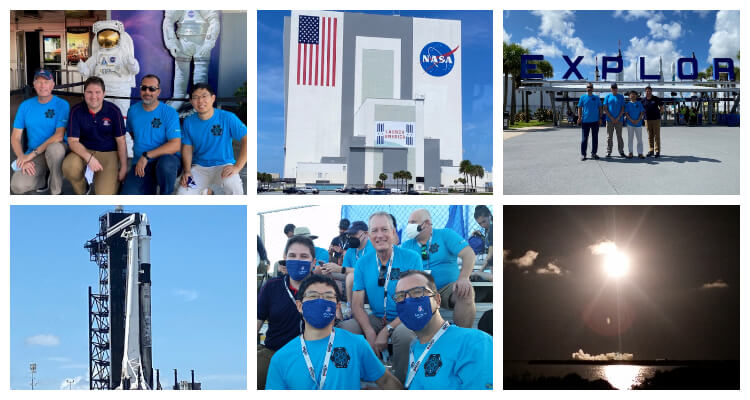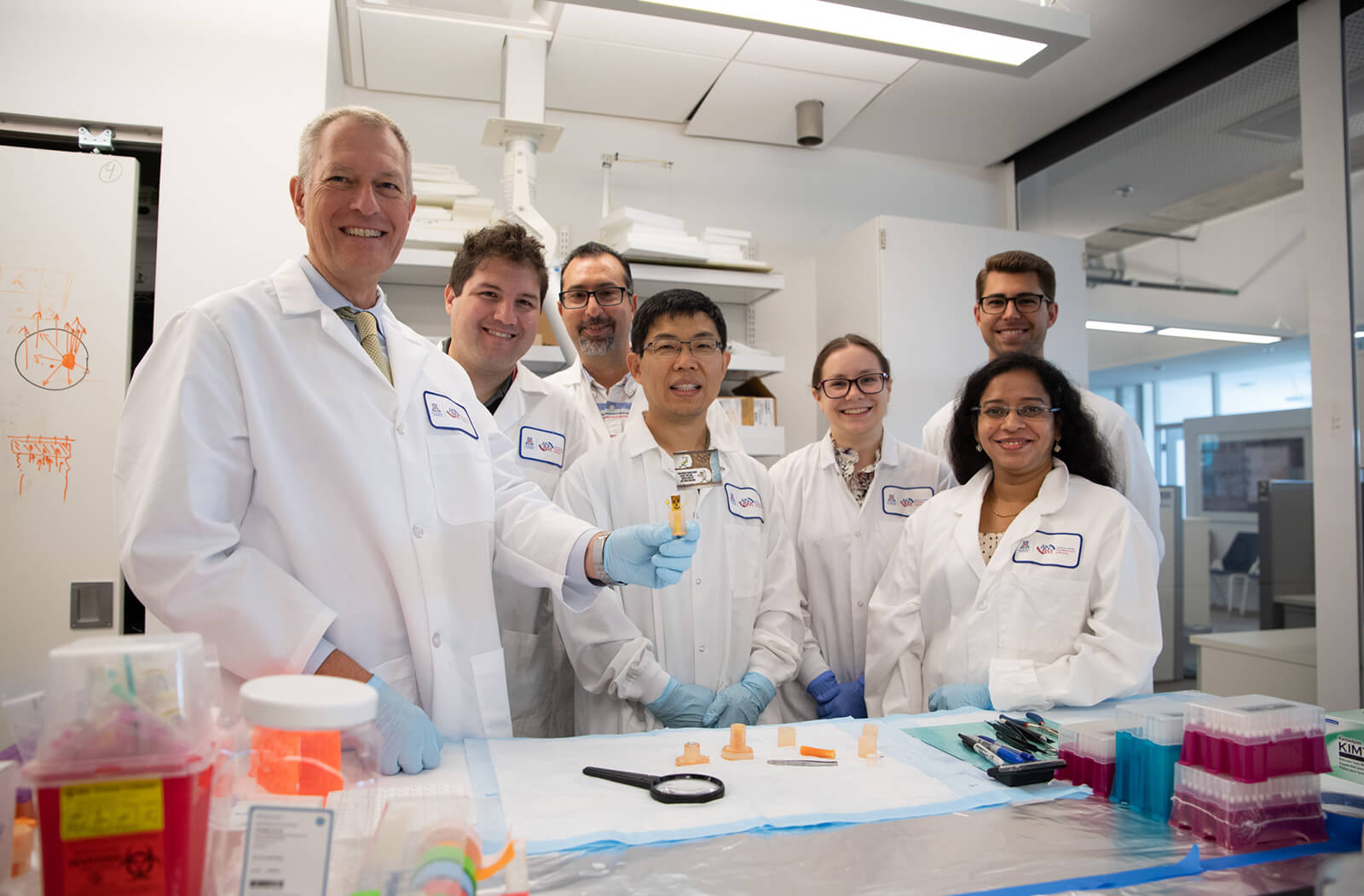
U of A Research Project to Monitor Health of SpaceX Inspiration4 Crew Members During Mission

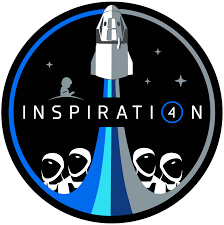 Space flight is not just for astronauts and rocket scientists anymore. SpaceX Inspiration4, the world’s first all-civilian mission, will make the dream of orbiting the Earth come true for a crew of civilians September 15. Researchers with the Center for Applied NanoBioscience and Medicine at the University of Arizona College of Medicine – Phoenix, led by Frederic Zenhausern, PhD, MBA, will provide the first in-flight testing of multiple biomarkers of stress, inflammation and immunity measured in a zero gravity environment to monitor the health of the four-member crew.
Space flight is not just for astronauts and rocket scientists anymore. SpaceX Inspiration4, the world’s first all-civilian mission, will make the dream of orbiting the Earth come true for a crew of civilians September 15. Researchers with the Center for Applied NanoBioscience and Medicine at the University of Arizona College of Medicine – Phoenix, led by Frederic Zenhausern, PhD, MBA, will provide the first in-flight testing of multiple biomarkers of stress, inflammation and immunity measured in a zero gravity environment to monitor the health of the four-member crew.
The essential task of protecting humans from exposure to these hazards is critical to the prospect of future deep space exploration. Zenhausern and his team developed a novel technology that will monitor crew members’ response to measure stress, inflammation and immune levels during space flight through a blood droplet from a simple fingerstick or a saliva sample.
“Our development of advanced molecular diagnostics for multi-purpose indications of emerging infectious diseases, health performance or risks of environmental exposure must benefit all populations where possible,” said Dr. Zenhausern, director of the Center for Applied NanoBioscience and Medicine and a member of the university's BIO5 Institute. “This Inspiration4 mission shares some operational requirements similar to a consumer health product to be performed at home or in low resources settings, which must be easy to use, minimally invasive, rapid and low cost.”
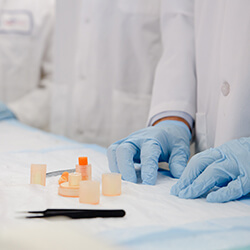
Zenhausern and his team designed the VeriFAST platform to assess a full range of biomarkers, from proteins to genes. While the Inspiration4 mission will take less than a week to complete, it will provide a unique opportunity to apply the VeriFAST platform to help researchers study the molecular and physiological levels in the human body under extreme zero gravity conditions. One of the biomarkers measured by VeriFAST is the C-reactive protein — whose level in blood has long been used as a diagnostic marker of inflammatory response, including the response occurring in cancer. This biomedical data will offer valuable insights and help inform the measures necessary to protect future astronaut crews in orbit during longer missions.
Zero gravity, confinement and radiation experienced during space flight can have significant health consequences. Space radiation is risky to the human body, potentially causing damage to the DNA in cells. Radiation exposure may occur during deep-space missions and can increase the risk of long-term health consequences, such as cancer. Adverse effects to the central nervous and cardiovascular systems may also occur. It is difficult to determine remotely the health consequences on the tissues and cells of crew members.
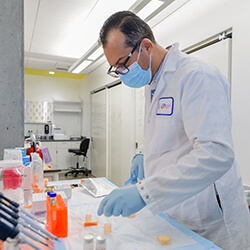
The Translational Research Institute for Space Health (TRISH) funded the project, which is part of a research complement to be conducted during the multi-day journey. The Inspiration4 crew, commanded by Jared Isaacman, founder and CEO of Shift4 Payments, will contribute to the space biomedical community by participating in important scientific research during the mission. Inspiration4’s goal is to inspire humanity and to advance cancer research through collaboration with St. Jude Children’s Research Hospital.
If the VeriFAST platform is validated by the Inspiration4 crew, it could provide a valuable blood and saliva analysis system to support the health and performance of future space crews. The biomedical samples collected during the Inspiration4 mission will become part of a biobank used for future collaborations by research teams at SpaceX, TRISH and the U of A College of Medicine – Phoenix.
“Innovation and problem-solving to improve health are at the core of what we do. That impact has been felt in Arizona, around the world and now for those in space,” said Guy Reed, MD, MS, dean of the U of A College of Medicine – Phoenix. “This collaboration with TRISH, SpaceX and the Center for ANBM creates synergies that will help to protect humans against radiation injury and other hazards that they encounter during space travel. It will fuel the development of new therapies and preventive strategies for crew members and patients here on Earth and beyond.”
Scenes from the Launch
About the College
Founded in 2007, the University of Arizona College of Medicine – Phoenix inspires and trains exemplary physicians, scientists and leaders to advance its core missions in education, research, clinical care and service to communities across Arizona. The college’s strength lies in our collaborations and partnerships with clinical affiliates, community organizations and industry sponsors. With our primary affiliate, Banner Health, we are recognized as the premier academic medical center in Phoenix. As an anchor institution of the Phoenix Bioscience Core, the college is home to signature research programs in neurosciences, cardiopulmonary diseases, immunology, informatics and metabolism. These focus areas uniquely position us to drive biomedical research and bolster economic development in the region.
As an urban institution with strong roots in rural and tribal health, the college has graduated more than 1,000 physicians and matriculates 130 students each year. Greater than 60% of matriculating students are from Arizona and many continue training at our GME sponsored residency programs, ultimately pursuing local academic and community-based opportunities. While our traditional four-year program continues to thrive, we will launch our recently approved accelerated three-year medical student curriculum with exclusive focus on primary care. This program is designed to further enhance workforce retention needs across Arizona.
The college has embarked on our strategic plan for 2025 to 2030. Learn more.
